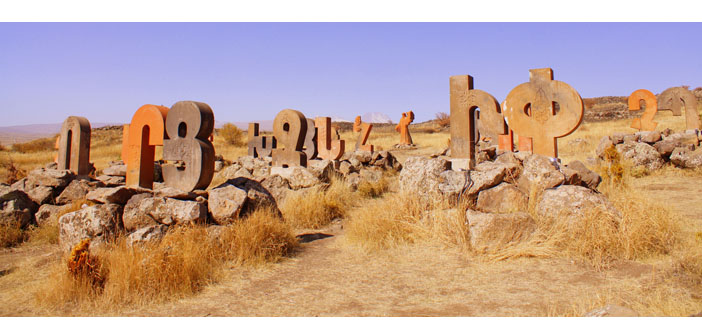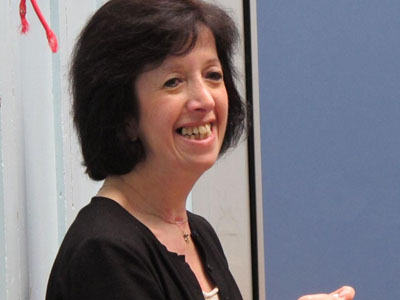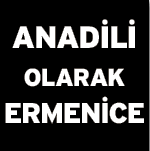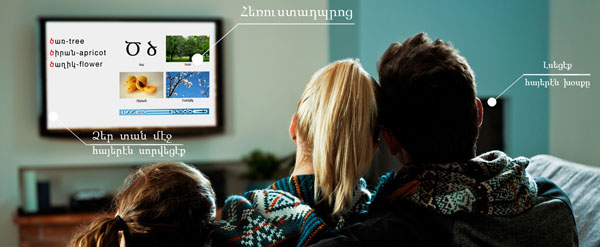Hayeren hemen şimdi!


Ermenilerin, soykırım sonrası dünyaya dağılmasıyla birlikte dili koruma kaygısı da giderek arttı. Her kuşağın, yaşadığı coğrafyanın koşullarına göre farklı zorluklarla mücadele ettiği günümüzde Batı Ermenicesini yaşayan bir dil kılmak için her alanda çalışmalar yürütülüyor. Bugün Doğu Ermenicesi Ermenistan’ın resmî devlet dili olarak varlığını daha korunaklı bir zeminde sürdürürken, diaspora, Türkiye, Lübnan başta olmak üzere Ortadoğu’da konuşulan Batı Ermenicesi doğal asimilasyonun etkisiyle tehlike altında. Konuyla ilgili dünyadaki durumu, merkezi Lizbon’da bulunan Kalust Gülbenkyan Vakfı’nın yürüttüğü ‘Batı Ermenicesinin Desteklenmesi’ programının sorumlusu Ani Garmiryan’la, Türkiye’deki durumu ise filolog ve Ermenice öğretmeni Sevan Değirmenciyan’la konuştuk. İki isimde çağın modern imkânlarından yararlanmak, dili öğretilen değil yaşanan bir iletişim aracı kılmak ve yaratıcılıktan yoğun biçimde yararlanmak gerektiği konusunda hemfikir.
Kalust Gülbenkyan Vakfı’nın Ermeni Toplulukları bölümü, 2014 yılında, ‘Ermeni halkı için, Ermeni dilinin ve kültürünün korunduğu, yaşanabilir bir gelecek yaratmak’ amacıyla beş yıllık bir proje açıklamıştı. Batı Ermenicesinin geleceğine dönük kaygıların sıkça dile getirildiği günümüzde, proje kapsamında yer alan ‘Batı Ermenicesinin Desteklenmesi’ programının sorumlusu Ani Garmiryan’la Batı Ermenicesinin dünyanın çeşitli ülkelerindeki durumu, bu konudaki projeleri ve gelecek planları üzerinde yoğunlaştık.
Gülbenkyan Vakfı’nın beş yıllık programı çerçevesinde Batı Ermenicesi için ne tür projeler üretilmesi ve desteklenmesi planlandı?
Üçüncü yılına girdiğimiz beş yıllık planın esas maddelerinden biri Batı Ermenicesinin desteklenmesi. Ben bu programla vakfa dahil oldum. Gülbenkyan Vakfı, özellikle Ortadoğu ve Avrupa’daki okullara, öğretmenlere ve öğrencilere maddi açıdan yardım eden bir kurum. Amerika ve Kanada’daki okullar programlara kısmen dahil olabilmiş. Yeni plana göre, özellikle dilin gelişimi için bir yol haritası hazırlandı. Ermenicenin güçlendirilmesi ve gelecek nesle aktarılması için şartların düzelmesini amaçlayan projeler hazırlanıyor.

Batı Ermenicesi dünyanın hangi ülkesinde, ne durumda? Bu yerler için farklı çözüm ve projeler mi geliştirilecek?
Lübnan, Ermenicenin toplumsal olarak yaşamaya devam ettiği, ev içinde ve dışında konuşulduğu, yazılı olarak da kullanıldığı, ancak daha çok Ermenilerle ilgili konularla sınırlı kaldığı bir yer. Dünyayı o dilde görme ve yaratma konusunda çalışma yapılması gerekiyor. Bu kapsamda geçen yaz bir proje başlattık. Lübnan’dan yaklaşık 45 lise öğrencisini davet ederek, onları Wikipedia’ya Batı Ermenicesiyle yazmaya alıştırmak ve özgüvenlerini kazanabilmelerini sağlamak amacıyla bir yaz kampı düzenledik. Öğrenciler yazarak ve tercüme ederek, daha da önemlisi yazabildiklerini görerek başarılı bir iş ortaya çıkardılar. Hâlâ yazmaya devam ediyorlar. Bu yaz aynısını Fransa’da yapmak istiyoruz. Avrupa ve Türkiye’deki öğrencilere de çağrı yaparak, yaklaşık 60 kişiyle bir yaz kampı düzenleyeceğiz. Batı ülkelerinde Ermenicenin ikinci dil olarak öğretilmesi, yöntemlerde farklılık yaratıyor. Ermenice öğreniminden bahsederken ikinci dil metodolojisini öne sürmekten korkmamak lazım. Olumlu şekilde öğrenilmiş her dil, yeni bir dil öğrenimine yardımcı olur. İran’dan ve Ermenistan’dan gelenlerle, Doğu Ermenicesinin de konuşulduğu, binlerce öğrencisi olan bir toplumun yaşadığı Amerika ve Kanada’nın ise ayrı ele alınması gerekiyor.
İki yıllık süreçte ne gibi çalışmalar yapıldı?
Dr. Hourig Attarian’ın Lübnan’daki okulların durumuyla ilgili Gülbenkyan Vakfı çerçevesinde hazırladığı bir raporu vardı. Biz de işe Lübnan’dan başladık. Lübnan’da bulunan toplam 26 okul, Gülbenkyan tarihi açısından bakarsak, en çok yardım alan okullar. Bu okullara dil eğitimi açısından nasıl yardım edebileceğimiz üzerine düşündük. Üniversitelerden öğretim üyeleriyle, dil üzerine çalışanlarla dokuz kişilik bir yerel komisyon kurduk. Teklifimiz şu oldu: Herhangi bir işleme başlamadan, okul toplumunu oluşturan herkese, yani öğretmenlere, öğrencilere, çalışanlara, ailelere, mezunlara, okullarıyla ilgili düşüncelerini aktarabilecekleri, kendilerini değerlendirebilecekleri yüzlerce soruluk bir anket sunmak. 23 okul bu ankete katıldı. Herkes aynada kendini, kuvvetli ve zayıf noktalarını gördü. Ortaya çıkan eksikliklerin birçoğunu kendilerinin halledebileceğini de gördüler. Ermeniceyle ilgili genel şikâyetler ve zayıf noktalarda ise, bu yıl içinde, komisyonla birlikte çalışarak birçok okulun yararlanabileceği ortak projeler sunacağız. Öte yandan, öğrenme güçlüğü çeken çocukların daha iyi anlaşılması ve eşit değerde eğitim alabilmeleri için Beyrut’taki Howard Karagözyan Vakfı’yla birlikte çalışıyoruz. Bu konuda öğretmenlerin de eğitim almasına yardımcı olabileceğimize inanıyoruz.
Geçen yıl Türkiye’yi de ziyaret ettiniz. Burada Ermenicenin desteklenmesi için nasıl bir yol haritası çizildi?
Türkiye’de de bir komisyon kuruldu. Okulların müdürleriyle görüştüm. Lübnan’da yaptığımız gibi, kendini değerlendirme anketiyle başlayacağız. 16 okula ankete katılmaları için davet sunduk. Önümüzdeki aylarda yapılmasını beklediğimiz anketin sonuçları ışığında, yerel komisyonla birlikte çalışarak, Türkiye’deki okullara yönelik projeler kazandırmak mümkün olabilecek. Fransa’da bulunan yedi Ermeni okulu da anketi uygulayarak kendilerini değerlendirme fırsatı bulacaklar. Okulu oluşturan herkesin kendi düşüncesini söylediği bir ortam kurmanın önemli bir adım olacağına inanıyoruz.

Program çerçevesinde düzenlenen toplantılarda ne gibi sonuçlara ulaşıldı?
Eylül ayında Paris’teki INALCO Enstitüsü ve Anahid Donabedian’la birlikte, 13 ülkeden birçok dilbilimcinin, üniversite öğretim üyelerinin ve okul öğretmenlerinin katıldığı bir konferans düzenledik. Batı Ermenicesinin eğitimde daha modern bir şekilde verilebilmesi üzerine, iki gün süren yuvarlak masa toplantıları yapıldı. Bu tip çalışmaları bir kartopu gibi büyütmek istiyoruz. Birçok yerde bireysel çabalarla güzel işler yapan insanlar var. Bugünkü iletişim araçlarının da yardımıyla, onların birlikte çalışabileceği ve buluşabileceği bir ortam hazırlamak istiyoruz. Bu yaz Portekiz’de, yaklaşık 40 eğitimci ve öğretim üyesinin katılacağı bir çalıştay planladık. Yazarlar, çizerler, çocuklar için çalışan insanlar yanyana gelip yaratıcı projelerini paylaşacak. Gençlere dili, tiyatro ve müzik gibi alanların yardımıyla yaratıcı biçimde öğreten ve sevdiren yöntemler üzerinde düşünmek gerekiyor. Başarılı olursak, herkes döndüğü ülkede etrafındaki insanları dil konusunda heveslendirebilir. Dile yaratıcı gücünü geri verebilmek çok önemli. Bütün bu söylediklerimiz ile, bizim dili gelecek nesle geçirme modellerimiz arasında büyük uçurum var.
Batı Ermenicesi öğretecek öğretmen sayısı az, yöntemler ve araçlar genellikle eski. Bu alanda nasıl ilerleme sağlanabilir?
Beni en çok ilgilendiren konu bu. ‘Dili kaybediyoruz’ korkusu paniğe, dilin gücüne olan inancı kaybetmeye, kötümserliğe teslim olmaya dönüşüyor. ‘Onu da, bunu da öğreteyim’ derken kültür valizi gittikçe ufalıyor. O dille enteresan bir şey yapmalısın. Mesela, çocuğun yaşına göre, dünyada yaşanan bir olayı konuşacaksın, olayla ilgili kelimeleri araştıracaksın. Ermenicenin ders dili dışına çıkıp güncel bir dil olması, düşünme dili olması lazım. Bir dilde düşünmeye başlamak kolay değil. Amaç, sadece somut kelimeler ezberletmek olmamalı, her konuda gerekli kavramları, soyut kelimeleri de vermek, öğrenilmekte olan dilin bilimsel bir dil olmasını sağlamak gerekli. Başka önemli bir nokta ise dilin, oyun diline dönüşmesi. Paris’te 26 sene önce ‘Mgnig’ adlı bir atölye kurduk. Çocukların kendi aralarında seve seve buluşacakları bir yer olsun ve o yerin dili Ermenice olsun istedik. Başlangıçta oraya gelenler, evde Ermenice konuşan ailelerin çocuklarıydı ve Fransız okullarına gidiyorlardı. Çocukların kendi aralarındaki organik dillerinden birinin Ermenice olmasını sağlamak istiyorduk. Çocuk, dili konuşmakta doğal bir anlam görmüyorsa, doğal olarak kullanmayı bırakması da uzun sürmez. Dili öğrenmek için kâğıt kalem alıp oturmalarını istemedik. Amaç, atölyelerde severek yapabilecekleri şeyleri, oyunları ilerletmekti. Mgnig haftasonları yaşam yeri oldu. Bugün hâlâ, orada yetişmiş olan birinci ve ikinci nesil, üniversiteyi bitirmiş ve işe başlamış olmalarına rağmen, aralarında Ermenice konuşuyor, Mgnig’i artık onlar yürütüyor. Aynı zamanda dünyaya açık insanlar oldular. ‘Collectif Medz Bazar’ müzik grubundaki gençlerin bir kısmı Mgnig’de yetişti. Gettolaşmaktan kaçındık, herkese açık olduk ve dünyaya açıldık.
Bir örnek üzerinden sorayım: Amaçlanan, ‘Herkes biraz Ermenice bilsin ve konuşsun’ mu, yoksa ‘kültür üretimi teşvik edilsin’ mi?
Amacımız, dili yaratıcı bir eleman olarak kullanmayı teşvik etmek. Ermenice müzik, çizgi roman veya tiyatro yaratılabilir. Ben İstanbul’da büyüdüm. Benim için Ermenice ders diliydi. Evde konuşulmasaydı, sıkıcı bir dil olarak kalabilirdi. Benim şansım, evde Ermeniceyi seven büyüklerimin olması, dilbilimi okumam, bu konuda düşünmem, çocuğumla Ermenice konuşacaksam ‘Ona ne tür şeyler verebilirim?’ sorusu üzerine kafa yormam, hevesin ne kadar önemli olduğunu keşfetmem oldu. Dile, onu korumak, onun kaybolmasını engellemek dürtüsüyle yaklaşırsak bir yere varamayız. Dil bir şans, bir kapıyı daha açabilecek anahtar, bir zenginlik... Çocuğa, ‘Al, dili sen kullan’ dememiz lazım. Her kelimesinde yanlış aramayı, çocukların zihinlerini açmayacak konularla ders işlemeyi bırakmak gerekiyor. Üç yaşında çocuk okula gitmeye başladığında, dünyayı evde konuşulan dille algılamaya başlamıştır. Başka bir dilde kelimenin anlamını bilmese de mantığıyla çözebilir. Onun sorularını cevaplamak, kendini rahat hissetmesini sağlamak önemli. İlle de modern teknolojiler gerekmiyor. Kâğıttan gülünç bir figür yaratarak, bahçedeki bitkilere birlikte bakarak da dili sevdirebilirsiniz. Anne dili çocuğa öğretmez, o dili konuşur. Okuldaki dil eğitiminde de böyle bir yaklaşım gerekiyor.

Yaratıcı gücünün kazandırılması ve dünyaya açılması için dili nasıl ele almak gerekir?
İnsan kendi bulunduğu yerden başlamalı. Okullarda bunu yapamıyorsak, dili sevilecek, konuşulacak, şakalaşılabilecek, düş kurulabilecek bir dil yapamıyorsak, ortada bir sorun var demektir. Mgnig, Fransa’nın tam merkezinde, çok rahat bir şekilde, yavaş yavaş kendini yarattı. Bir örnek vereyim. Bir gün atölyede çocuklar oyun oynarken, baktım dilleri Fransızcaya döndü. Çocuklara ‘Ermenice konuşun’ diye baskı yapmadım. Bu kaymanın sebebini bulmak istedim. Çocuklar ayrı okullarda eğitim görmelerine rağmen, okullarında aynı oyunu oynamışlardı. Bunu fark edip, ortaya Ermeniceyle oyunlar attık. Sık sık anlattığım bir olay daha var. Bir gün çocuklarla metroya doğru yürürken, aralarında Fransızca konuştuklarını duydum ve kulak verdim. O dönem Fransa’da erken seçimlere gidilecekti. Çocuklar meraklı, politikayla ilgi duyuyorlar. Ancak bu konuyu Ermenicede nasıl konuşacaklarını bilmiyorlar. Biz Ermenice masal anlatmışız, onlar politikayla ilgilenmişler. Parti isimleri, politik terimler uzun. Ermenice gazeteleri topladım, konuya ilişkin kelimeleri yanyana koyarak bir oyun yarattım. Büyüklerin öğrenmesi lazım dediğim şey tam olarak bu. Çocuklara bakarak, onların merak ettikleri şeyleri fark edip, sessizce masaya bırakmaları gerekiyor.
Ermenice öğreniminde zorlanılan konulardan biri de imla. Bu konuda nasıl bir yöntem izlenebilir?
Öğrenme psikolojisinde de ilerlememiz gerektiğine inanıyorum. ‘Bu iş çok zor’ diyerek gidersek, işimiz daha da zorlaşır. Her dilde durum aynı. İmlaya gelmeden çok şey var. Dili önce duymak, sevmek, o dilde şakalaşmak, uydurmak, kelimeler bulmak, hayal kurmak lazım. Ermeniceyi çocukların kulağının duyması ve gözünün görmesi gerekiyor. Okumaya başlamadan önce görmesinden bahsediyorum. O gördükleriyle, çok güzel resimler arasında bağlantı kurmalı. Örneğin, Anahid Sarkisyan’ın kitaplarını leblebi gibi yutmalı. Çocuğun dört yaşına kadar dille tanışması ve o dilde oyun oynaması, o dile kendini ait hissetmesi, onu okula başladığında dile açık hale getirmiş olacak. Sonra yazmaya başlayacak. Belki tersten yazacak, yanlış yazacak. Biz Mgnig’de ‘amot’ (ayıp), ‘çar’ (yaramaz), ‘skhal’ (yanlış) olumsuz kelimeleri kullanmamaya özen gösteriyorduk. Çocuğun hevesini kırmadan öğretmek gerekiyor. Çocuk duyduğu gibi yazmaya başladığında hatalar yapacaktır. Ermenicede okumak ve yazmak genellikle 12. yüzyıldan kalma bir anlayışla devam ediyor maalesef. Okumak, deşifre etmekle bir tutuluyor. Dünyada ise okumak, anlamak demek. Metinde çocuğun bilmediği kelimelerin sayısı çoksa, o metni okutmak iyi yöntem değil. Mesela bir şiir vermek yerine 10 tane ver, hepsini okusunlar, hangisini, neden sevdikleri üzerine konuşsunlar. Çocuk kendi öğrenme sürecine katkıda bulunsun. Yazmayı da kopya etmek sanıyoruz. Yazmak, düşündüğünü kâğıt üzerine aktarmaktır halbuki. Güçlendirmemiz gereken bu. Düşündüğünü yazarken çocuğun yanlış yapma korkusu olmamalı. Örneğin, bir metin yazdırdık. On çocukta aynı imla hatası varsa ufacık bir ders yapılabilir, çocuklar o imla kuralını birlikte keşfederler, gerekeni ögrenirler, kelimeyi veya kuralı büyükçe yazıp duvara asabilirler, geçerken gözlerine çarpar, yavaş yavaş öğrenebilirler. Hatta inanın, bir gün gelir, ‘Buna artık gerek kalmadı’ deyip kelimeyi duvardan indirmeye karar verirler. Çocuğa zaman vermek lazım. İmla okumayla düzeltilebilir ancak. Biz Mgnig’de not vermedik, ezberletmedik ama çocuklar kendi istekleriyle imlayı da çok güzel öğrendi.
Yeni teknolojilerin kullanımı dil öğretimi için kaçınılmaz hale geldi. Bu alanda ne tür projeler geliştirilebilir?
Dil her yerde olduktan sonra, modern teknolojilerle daha da ilerlerse, insanın 24 saatini alabilecek bir seviyeye varır. Ermeniceden bahsederken bu durumu göz önünde bulundurmak lazım. Duvarlarda, sokakta Ermenice yok. Bugün şarkıları bile Doğu Ermenicesiyle söylüyoruz. Bütün yeni teknolojileri alsak, ancak üzerinde ne yaratacağımızı bilmezsek, bir işe yaramaz. Öncelikle doğru düzgün neyi, nasıl yapmamız gerektiğini bilmeye ihtiyacımız var. Tercüme etmek, bir dilin zenginleşmesi için çok önemli. Vakıf olarak, kitap tercümelerini destekliyoruz. Yakında bir liste sunulacak. Modern düşünür ve yazarların, çağdaş konuların Ermeniceye çevrilmesi sağlanacak. Bu Türkçeyi ve Doğu Ermenicesini de içeren bir proje. Kartopu olarak büyümek, teknolojik gelişmeleri de kapsıyor. Oyun ve dile yönelik dijital uygulamalara açığız. Ermenistan’da bulunan TUMO Merkezi’yle modern teknolojiye bağlantılı olarak yapılabilecekler üzerine konuşuyoruz.
Türkiye’de Ermenicenin salt ders dili olarak kalmaması için, okul dışı projeler üretilebilir mi?
Türkiye’de yaşayan Ermenilerin dil tarihine baktığımızda daha karmaşık bir denklem görürüz. Batı Ermenicesi Anadolu’nun dili, Türkiye Batı Ermenicesinin anavatanı. Buradan bakarak Ermenistan’da ve İran’da konuşulan dile Doğu Ermenicesi denir. Osmanlı İmparatorluğu sınırları içinde yaşamış ve daha sonra diasporaya dağılmış Ermenilerin konuştuğu dil ise Batı Ermenicesi. Diğerini yok saymadan, Batı Ermenicesinin önemini kavramamız gerekiyor. Bugün toprağı olmayan ama derin bir kültürü olan bir dilden bahsediyoruz. Öncelikle, Türkiye, lehçeleri kaybolmuş olan ama bir üst dil olarak varlığını sürdüren Batı Ermenicesine sahip çıkmalı. Gülbenkyan Vakfı’nın programında, sadece okulda değil, okul dışında da dili öğrenmek ve öğretmek isteyenlerin projelerine de yer var.
Son olarak bir de Halep’i soralım. Halep, Batı Ermenicesinin sadece konuşulduğu değil, üretildiği de bir yerdi. Savaş sebebiyle Halep’ten Ermenistan’a olan göç, dilin durumunu nasıl etkiler?
Suriye’de yaşayan Ermeniler Beyrut’a, Avrupa’ya, Ermenistan’a dağılıyorlar. Ermenistan’da durum ne olabilir? Doğu Ermenicesi baskın çıkabilir. Çocukların, gittikleri yerlerde yaşayan çocukların diline yanaşması kaçınılmaz. Ermenistan devletinin ve sivil toplumun bu konuyu ciddi bir şekilde ele alması lazım. Batı Ermenicesinin Ermenistan’da çalışılması ve kullanılması için yerel kurumların öncü olması şart.
‘Dili kafese koymuş durumdayız, ezberletmeye yönelik çalışıyoruz’
Öğretmen eğitimleriyle ilgili yakın zamanda başlayacak bir çalışmanız olacak mı?
Bu yaz yapacağımız çalıştaydan sonra başka bir proje daha planlıyoruz. Çocukların ve gençlerin de katılacağı bir aylık bir yaz kampı programı hazırlamak istiyoruz. Kendi öğretme tarzlarını değiştirmek isteyenleri, dil öğretimine katkıda bulunmak isteyenleri, öğretmenlik yapmadan çocuklarla ve gençlerle birlikte yaratmak isteyenleri buluşturacak bir ortam yaratacağız. Genel olarak Ermeniceyi öğretme modeli olarak iyi yolda değiliz. Dili kafese koymuş durumdayız, ezberletmeye yönelik çalışıyoruz. Çocuğu merkez alan yöntemlerin yaratıcı gücüne kendileri tanık olan öğretmenler, ülkelerine döndüklerinde yeni yöntemleri uygulayabilirler. Öğretmenlerimizin yaratıcı ortamda ilerlemesi, öğretmen kurslarının bu şekilde olması daha verimli. Öğretmene klasik şekilde, ‘Çocuğa ne öğretilir, hangi yazarın kaç kitabının okutulması gerekir?’ gibi sorular üzerinden bir eğitim değil, dilin ne şekilde ve hangi şartlarda öğretilmesi gerektiği üzerine eğitimler vermeyi amaçlıyoruz.’


